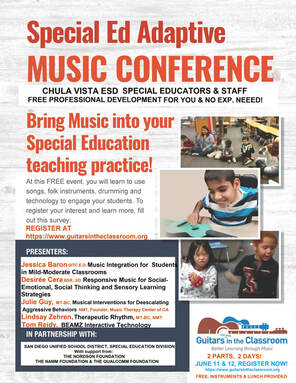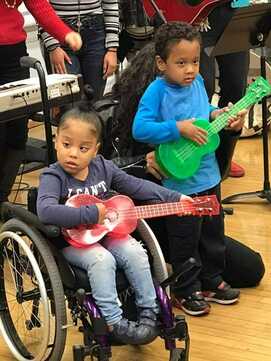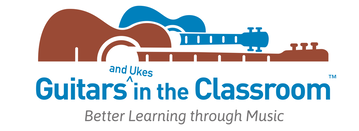 What is Adaptive Music all about and what makes it so "AMASE-ing?" For most of us, learning to make music is a complex process that involves putting a myriad of motor skills, small and large to work. Our arms, hands and fingers, our legs, feet and toes, our ears, eyes and mouths, our hearts, our lungs, our heads, necks and torsos, and all that gray matter that connects the musical and physical dots for us are involved. We are all born with musical potential, no matter what our bodies and brains can or cannot do with ease. But what happens to children if some part of their anatomical tool box doesn't exist or doesn't work very well? Can a person with limiting conditions develop alternate ways to approach making music? The answer, of course, is "Yes, they can, and they must be given that chance." Not only can all students learn to enjoy making music, but those who face major challenges physically, cognitively or emotionally stand to gain a great deal by having this opportunity. Think of superstars like the irreducible Django Reinhardt, Stevie Wonder, Evelyn Glennie or Rick Allen of Def Lepard to get a glimpse of what is possible. There are so many musicians who have not let impairments stand in their way. So what can we do for our students who spend every day isolated from regular music instruction opportunities? We can break down the barrier to making music by training the adults who teach and assist students with special needs to lead the way. This approach is still new and the teachers and paras who are already participating are already successfully leading music every single day!  AMASE Conferences last two days. During this time, special education professionals gather together to learn and to improvise exciting ways to create inclusive, effective music instruction. We share adaptive practices and techniques for making instruments more accessible for students. Trainers in innovative technologies participate as do local music therapists who teach specialized interventions such as the artful de-escalation of aggressive behavior and refocusing students away from stressful triggers and toward productive participation. GITC is able to offer these trainings to 45 participants each time and to do this at no charge thanks to very important grants from the Nordson Foundation, the Qualcomm Foundation, the NAMM Foundation, and with charitable participation from generous music products sponsors and amase-ing individual donors! We are deeply thankful to each and all for this compassionate support. At GITC, we know AMASE has to offer a broad array of musical opportunities so that we can include students regardless of what kind of mountain they might be climbing. Ukuleles are fantastic but so are drums! We are crazy about REMO's Comfort Sound Technology drums created for students with special needs and hypersensitive hearing. So is the Beamz Interactive Unit!
Paralysis might look like a barrier but it need not be. With eye gaze technology, eye movements are enough to trigger musical instruments that work with computers. Spastic muscles might make it hard for students with Cerebral Palsy to strum strings or strike drums, but adaptive grips. picks and mallets solve that. The variety of approaches to making music accessible is pretty good now and will only grow with time and exploration. We want to make sure these approaches reach the kids who can benefit from them the most. This is why, through AMASE, we are "gathering the tribe" - calling all sorts of innovators together to join us in training special educators and paraprofessional staffers, speech and language therapists, occupational therapists, counselors and others to bring music making to students with special needs. Are you hearing the call? Please reach out to us. Let us know. It takes quite a large village to make this endeavor possible! To discuss ways to get involved, please drop us a line! And to see when our next AMASE Conference is taking place, please visit our PROGRAMS PAGE. We look forward to hearing from you and thank you for learning about AMASE.
1 Comment
11/15/2019 05:20:34 am
I would like to connect with any adaptive music educators in Maryland or Delaware.
Reply
Leave a Reply. |
BlogArchives
June 2024
Categories
All
|
Copyright © 2024 Guitars In The Classroom. All rights reserved.

 RSS Feed
RSS Feed